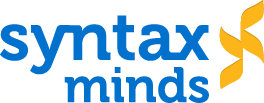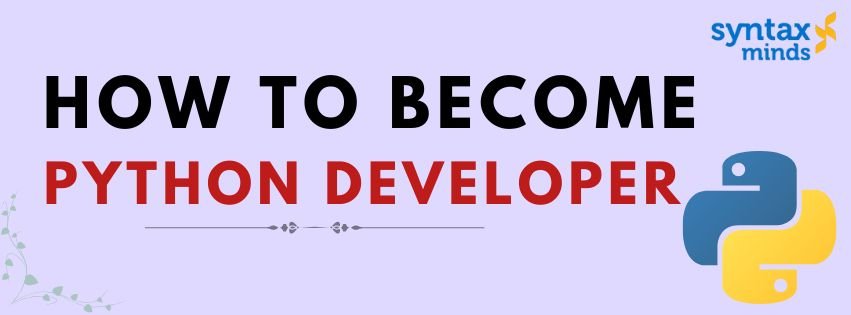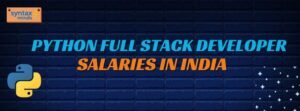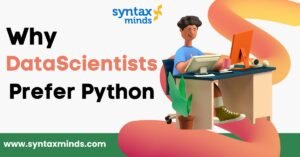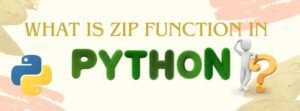Table of Contents
ToggleHOW TO BECOME PYTHON DEVELOPER
Becoming a Python developer involves several steps, ranging from learning the basics to mastering advanced concepts and frameworks. Here’s a comprehensive guide to help you every step of the way:
Learn Python Basics
Syntax and Structure: Begin by learning Python syntax, including variables, data types (such as strings, lists, dictionaries, tuples, and sets), operators, and control flow (like if/else statements and loops).
Functions and Modules: Learn how to define functions, pass arguments to them, and return values from them. Understand how to use built-in modules and create your own.
Error Handling: Learn exception handling with `try`, `except`, `finally`.
File Handling: Understand reading from and writing to files using Python.
Resources:
Books For Beginners:
- “Automate the Boring Stuff with Python” by Al Sweigart
Description: This is one of the most popular beginner books. It teaches Python by showing how to automate everyday computer tasks like organizing files, web scraping, and working with spreadsheets.
Why it’s great: It’s highly practical, accessible, and hands-on. Even if you’re new to programming, the examples are clear, and the projects are fun.
Best for: Absolute beginners and those who want to solve practical problems with Python.
- “Python Crash Course” by Eric Matthes
Description: This book is a beginner-friendly introduction to Python, offering a strong foundation in Python programming followed by a series of practical projects.
Why it’s great: It covers both the basics and introduces real-world projects like creating a simple video game, a data visualization app, and a web app.
Best for: Beginners who want a solid understanding of Python basics and enjoy working on projects.
- “Learn Python the Hard Way” by Zed A. Shaw
Description: This book focuses on exercises that teach you the basics of Python and programming by forcing you to type out code rather than copy-paste. It encourages you to think critically about what you’re doing.
Why it’s great: It emphasizes discipline and hands-on practice, helping you internalize Python syntax and logic.
Best for: People who are determined to learn and understand Python by doing.

Practice Coding
Problem-Solving: Start practicing coding challenges on platforms like [LeetCode](https://leetcode.com/), [HackerRank](https://www.hackerrank.com/), and [Codewars](https://www.codewars.com/).
Projects: Build small projects like a calculator, to-do list app, or a simple text-based game.
Understand Object-Oriented Programming (OOP)
Classes and Objects: Learn how to define classes and create objects in Python.
Inheritance, Polymorphism, Encapsulation: Understand how to use these OOP principles to design reusable and maintainable code.
Master Advanced Python Concepts
Data Structures: Study advanced data structures like linked lists, trees, heaps, and graphs.
Algorithms: Understand sorting algorithms (bubble sort, merge sort, quicksort) and search algorithms (binary search, DFS/BFS).
Decorators, Generators, and Iterators: Get comfortable with Python’s advanced features for efficient and clean coding.
Concurrency and Parallelism: Learn about threads, multiprocessing, and asynchronous programming with `asyncio` to handle tasks concurrently.

Learn Python Libraries and Frameworks
Python is used in various domains, so the libraries and frameworks you should learn depend on your area of interest. Here are some popular ones:
Web Development:
Flask (lightweight web framework)
Django (full-featured web framework)
Data Science:
NumPy (numerical computations)
Pandas (data manipulation)
Matplotlib and Seaborn (data visualization)
Scikit-learn (machine learning)
Automation:
Selenium (browser automation)
BeautifulSoup (web scraping)
GUI Development:
Tkinter (build desktop applications)
PyQt or Kivy (more advanced GUI libraries)
Version Control (Git)
Learn how to use Git for version control. Understand basic commands like `git init`, `git add`, `git commit`, `git push`, and `git pull`.
Platforms like GitHub or GitLab will allow you to store and share your code with others, collaborate on projects, and build a portfolio.
Work on Real Projects
Start building more complex projects to improve your problem-solving skills. Some ideas:
Web applications with Flask or Django.
Data analysis projects using Pandas and Matplotlib.
Automation scripts to automate tasks you encounter in your own workflow.
REST APIs using Flask or FastAPI.

Learn Testing and Debugging
Unit Testing: Learn how to write unit tests using the `unittest` or `pytest` libraries.
Debugging: Learn how to use Python’s built-in debugger, `pdb`, or debugging tools in IDEs like VSCode or PyCharm.
Stay Up to Date
Python is evolving, so it’s important to keep learning. Follow Python-related blogs, podcasts, and video channels to stay updated.
Subscribe to blogs like [Real Python](https://realpython.com/) and [Python Software Foundation](https://www.python.org/blogs/).
Follow developers and Python experts on Twitter or LinkedIn.
Build a Portfolio and Network
GitHub: Set up a GitHub profile and start uploading your projects to showcase your work. This will serve as your coding portfolio and is often required by employers.
Personal Website: Create a website or blog where you can showcase your projects, achievements, and technical skills.
Networking: Join Python communities on Reddit, Stack Overflow, or attend local meetups and conferences to connect with other Python developers.
Apply for Jobs
Junior Developer Roles: Look for entry-level Python developer positions or internships. Even if you don’t have extensive experience, an active GitHub account with real-world projects can make a huge difference.
Freelance/Contract Work: If you’re not ready for a full-time role, start with freelance or contract projects. Websites like Upwork, Fiverr, and Freelancer can help you find opportunities.

Never Stop Learning
Python is a broad language with many uses, so there’s always more to learn. Specializing in areas like web development, machine learning, or automation will help you deepen your knowledge.
Example Learning Roadmap:
- Month 1-3:
Python basics, functions, data structures, and OOP.
Simple projects: command-line apps, small scripts.
- Month 4-6:
Learn libraries (Flask/Django for web, Pandas for data science).
Build more complex projects (e.g., a web app, data analysis project).
- Month 7-9:
Learn Git and collaborate with others.
Start learning advanced topics like async programming and testing.
- Month 10-12:
Build a portfolio with diverse projects.
Start applying for internships or junior developer positions.
By following these steps, you’ll gradually build up the skills and experience needed to become a proficient Python developer. The key is consistency, practice, and building real-world projects that showcase your abilities.
